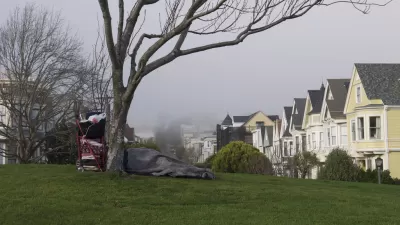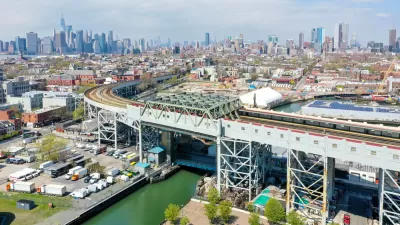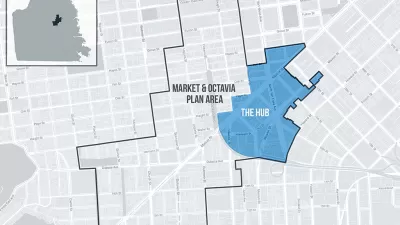In San Francisco, the relatively affluent are vocal in their denunciation of the "gentrifying" effects of the more affluent. This debate clouds the city's fundamental problems in housing its poor and working class residents, says Ilan Greenberg.

In San Francisco, "the debate [over gentrification] is dominated by fierce new champions of the anti-gentrification cause who aren't concerned so much about the truly poor being forced from—or tempted out of—their neighborhoods," writes Greenberg. "In their view, the victims of gentrification are also affluent, just less so than the people moving in."
“Middle-class people being bought out by upper-income people—that may be a political issue, but it’s not what we would call gentrification,” says Robert J. Sampson, an urban sociologist at Harvard University. “The affluent moving in—that’s an urban battle, but not gentrification.”
But for Dawn Phillips, co-director of programs for Causa Justa, a neighborhood organization responding to resident displacement in Oakland, and other advocates for the disadvantaged, these debates among the relatively affluent obscure the city's more significant problems.
"In Phillips’s world, the urgent issue isn’t whether the Bay Area’s new wealth has the same perspective and experience as the old. Nor is Phillips losing sleep over where in the city middle-class people are supposed to live," notes Greenberg. "Rather, for Phillips, the gentrification problem concerns government policies that for decades disinvested in neighborhoods, only to turn around and encourage real-estate investment when richer neighbors moved close. This, Phillips argues, systematically pushed vulnerable, disadvantaged people to the geographic margins, where there is little work, community resources, or personal networks."
FULL STORY: I Left My Home in San Francisco: The rise of the white, middle-class anti-gentrifiers

Alabama: Trump Terminates Settlements for Black Communities Harmed By Raw Sewage
Trump deemed the landmark civil rights agreement “illegal DEI and environmental justice policy.”

Planetizen Federal Action Tracker
A weekly monitor of how Trump’s orders and actions are impacting planners and planning in America.

The 120 Year Old Tiny Home Villages That Sheltered San Francisco’s Earthquake Refugees
More than a century ago, San Francisco mobilized to house thousands of residents displaced by the 1906 earthquake. Could their strategy offer a model for the present?

In Both Crashes and Crime, Public Transportation is Far Safer than Driving
Contrary to popular assumptions, public transportation has far lower crash and crime rates than automobile travel. For safer communities, improve and encourage transit travel.

Report: Zoning Reforms Should Complement Nashville’s Ambitious Transit Plan
Without reform, restrictive zoning codes will limit the impact of the city’s planned transit expansion and could exclude some of the residents who depend on transit the most.

Judge Orders Release of Frozen IRA, IIJA Funding
The decision is a victory for environmental groups who charged that freezing funds for critical infrastructure and disaster response programs caused “real and irreparable harm” to communities.
Urban Design for Planners 1: Software Tools
This six-course series explores essential urban design concepts using open source software and equips planners with the tools they need to participate fully in the urban design process.
Planning for Universal Design
Learn the tools for implementing Universal Design in planning regulations.
Clanton & Associates, Inc.
Jessamine County Fiscal Court
Institute for Housing and Urban Development Studies (IHS)
City of Grandview
Harvard GSD Executive Education
Toledo-Lucas County Plan Commissions
Salt Lake City
NYU Wagner Graduate School of Public Service





























